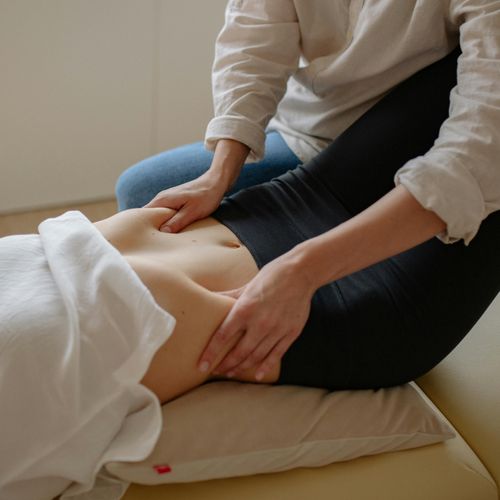In Japanese culture, the Hara, which literally translates to the lower abdomen, carries profound psychological and spiritual meanings. The Hara is considered the unification of a person’s physical, psychological, and spiritual dimensions, playing a crucial role in overall well-being. Let’s take a closer look at the significance of the Hara, its deeper meanings, and how treating it can enhance holistic health.
Understanding the Hara
The term "Hara" encompasses much more than just the physical abdomen. It represents a person's true nature and serves as the center of one's vital energy, or ki. In traditional Japanese practices such as Chosei Zen, the development of the Hara is fundamental for entering deep states of concentration (samadhi) and generating psychophysical energy. This holistic view of the Hara highlights its importance in achieving balance and harmony within the body, mind, and spirit.
The Deeper Meaning of Hara
Beyond its physical location, the Hara symbolizes sincerity, truthfulness, and emotional stability in Japanese culture. Phrases like "hara o waru" (to slit open one's belly) signify openness and honesty, while "hara ga dekite iru" (the stomach is complete) denotes complete calmness in any situation. These expressions reflect the Hara's role in embodying one’s true nature and maintaining inner peace, even amidst life's challenges.
Supporting Digestive Wellness with Hara Care
The physical Hara houses essential organs such as the stomach, intestines, liver, and pancreas, all of which are vital for digestion, metabolism, and detoxification. Focusing on the Hara can lead to significant improvements in digestive health and overall physical well-being. Proper functioning of these organs ensures effective nutrient absorption, waste elimination, and metabolic balance, which are essential for maintaining optimal health.
Research has confirmed the effectiveness of abdominal massage in promoting bowel movements and alleviating constipation. A comprehensive meta-analysis on the efficacy of abdominal massage for functional constipation demonstrated that this practice significantly improves defecation frequency, stool consistency, and overall bowel function. Individuals receiving regular abdominal massage experienced notable relief from constipation symptoms compared to control groups, highlighting the benefits of this holistic approach. Explore the full study here.
Furthermore, abdominal massage stimulates the vagus nerve, enhancing gut motility and promoting smoother, more regular bowel movements. This practice also boosts blood circulation and lymphatic drainage in the abdominal area, ensuring that essential nutrients and oxygen reach the digestive organs while aiding in the removal of toxins. Together, these effects support the health of the Hara and contribute to overall physical well-being.
Emotional and Mental Balance
The Hara is also central to emotional and mental stability. In Japanese Medicine, Chinese Medicine and Ayurveda, the abdomen is closely linked to emotional states. Practices such as abdominal breathing and meditation, which focus on the Hara, can significantly reduce stress and anxiety, promoting a state of mental clarity and emotional balance.
The study "Effectiveness of diaphragmatic breathing for reducing physiological and psychological stress in adults: a quantitative systematic review" evaluates the impact of diaphragmatic breathing on stress reduction in adults. It examines physiological and psychological outcomes, highlighting improvements in respiratory rate, salivary cortisol levels, blood pressure, and stress levels. The review includes a range of studies that collectively demonstrate the effectiveness of abdominal breathing as a low-cost, non-pharmacologic intervention for stress management. Learn more about it here.
Spiritual and Energetic Wellness
The Hara is viewed as the body’s energetic center. In practices like Shiatsu, Reiki, Tai Chi, the Hara is the reservoir of life force energy (Qi). Strengthening the Hara through holistic practices can enhance energy levels, facilitate healing, and promote spiritual growth. The Hara serves as a solid foundation for spiritual development, much like the roots of a tree that allow it to grow and withstand external forces.
Holistic Practices to Nurture the Hara
Abdominal Massage Therapy: Abdominal Shiatsu stimulates digestive organs, improves circulation, and releases tension stored in the abdomen. This type of massage therapy helps in detoxifying and energizing the Hara, providing both physical and energetic benefits.
Breathwork: Diaphragmatic breathing and Hara breathing exercises focus on centering the mind and body, reducing stress, and enhancing the flow of energy. These practices are simple yet powerful tools for connecting with your core and promoting overall well-being.
Mindful Eating: Paying attention to what and how you eat supports the health of your Hara. Consuming whole, nutrient-dense foods and practicing mindful eating can improve digestion and contribute to emotional balance. But it’s not just what you eat, it’s how you eat. Carving out time in your schedule to eat and enjoy your food is crucial for healthy digestion.
Movement Practices: Engaging in exercises that focus on the core, such as yoga, Pilates, and Tai Chi, strengthens the physical muscles and enhances the flow of energy in the Hara. These practices promote both physical and energetic stability.
Meditation and Visualization: Guided meditations that focus on the Hara help in grounding and balancing energy. Visualizing a bright light or warm sensation in the abdomen can deepen your connection with this vital area and promote inner peace.
Treating the Hara is a holistic approach that encompasses physical, emotional, mental, and spiritual dimensions of health. By nurturing this central powerhouse, we can achieve a balanced, energized, and harmonious state of being. Embracing practices that focus on the Hara leads to profound improvements in overall health and well-being. A strong Hara forms the foundation of a healthy, vibrant life, allowing us to connect with our true nature and experience life with openness and calmness.













